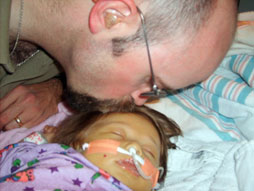By Kendra Ludwick/reporter

Brian Blair, a full-time NE Campus student, husband, dad and worker, has one prayer for his daughter—a liver transplant.
Erikah Marie Blair was born Sept. 15. She developed jaundice (a yellow color to the eyes and skin) soon after birth and was sent to Cook Children’s Hospital because her pediatrician was worried it was worsening. Two days after her evaluation of jaundice, she was sent into surgery at 3 months old.
“ She was in surgery for what they [doctors] thought was a cyst, but 45 minutes into it, her surgeon came out and took us to the little room to tell us that it was a serious disease called biliary atresia,” Brian said.
Brian, his wife of five years, Chalea, and two sons were devastated. He wondered if there was anything he could have done to prevent it, but he knew he had no control.
“ All we could do was cry and pray, and try to hold ourselves together,” he said.
The cause for biliary atresia is unknown, but it affects only newborns and is not preventable. The inflammatory process begins soon after birth and affects the bile ducts. However, Erikah was born without bile ducts in her liver, and that condition affects her digestive system.
Erikah has had two surgeries to try to correct the problem, but they were unsuccessful. Her doctors then recommended a liver transplant.
For the condition Erikah has, she cannot have a live-donor transplant (where doctors take part of a live-donor’s liver, usually a close friend or family member, and transplant it). She must have a full cadaver liver from an infant.

“ Her doctors have now determined without a transplant, she will die,” Brian said. “Most likely before she reaches 18 months of age.”
Erikah’s evaluation process is coming up soon to determine when she will be put on the transplant list. She will be admitted to the hospital for a few days for testing. Therefore, she could be added to the list in as little as one to two weeks from now.
When she is added, Brian and Chalea will receive a pager and wait for it to go off. When the pager goes off, a liver will be waiting for Erikah. She will then be in the hospital for up to six or more weeks depending on complications.
“ Our daughter’s life will be saved only if someone decides to donate their loved one’s organs,” Brian said. “Many people die every day because they could not get their organs in time. This is very sad.”
The process for receiving a transplant has recently changed. In the past, the people who waited the longest would receive the organ they needed, no matter who needed it the most. Now, whoever is a match and closest to death will receive the organ.
“ I feel comfort in knowing that even if my daughter is only on the list for a few days, if she is the sickest, she will get her liver faster,” Brian said.
Erikah has to take expensive medication, most not covered by insurance, every morning and night. Brian and Chalea both work, but have to take off a lot for doctors’ appointments.
“ After Erikah’s transplant, she must stay on expensive anti-rejection drugs her entire life or she will die,” he said.
Brian, Chalea and the kids pray everyday for God to help heal their sister.
“ We just try to keep everything as normal as possible for the sake of our children and ourselves, one day at a time,” he said.
Brian and Chalea have a non-profit donation fund at Wells Fargo. Donors can call 1-800-To-Wells or go to any Wells Fargo, mention the name Chalea Blair, and ask to donate to the Erikah Blair Liver Donation Fund.
Funds received will be used for medications, lost wages and expenses directly related to Erikah’s medical treatment.
More than 94,000 people are waiting for the gift of life, but only 77 people a day receive a transplant. Worse, 19 people die each day waiting for transplants.
Donors have the potential to save up to eight lives as an organ donor and touch another 50 lives as a tissue donor. Many people do not know how to become a donor, need more information or are afraid. Here are the specifics and how to get started.
THE FACTS
• The No. 1 priority in the hospital is to save a life; donations are considered only after death• Financial or celebrity status is not important. What counts is severity of illness, time spent waiting, blood type and other medical information.
• The body is treated with respect during the donation process, and open casket funerals are possible for organ, eye and tissue donors.
• There is no cost to the donor’s estate or family for organ or tissue donation.
• Signing a card or driver’s license may not be enough to satisfy state requirements, so take the necessary steps to become a donor and make wishes known.
WHO CAN DONATE?
Both senior citizens and newborns can donate organs. The condition of the organ is more important than age. The few exclusions include being HIV positive or having active cancer or systemic infections. Donors under the age of 18 will need parental consent.
WHAT CAN BE DONATED?
Organs such as kidneys, heart, lungs, liver, pancreas and intestines can be transplanted.
Tissues from the corneas, middle ear, skin, heart valves, bones, veins, cartilage, tendons and ligaments are used to restore sight, cover burns, repair tissue and hearts and replace veins.
Stem cells donations include marrow, peripheral blood stem cells and cord stem cells.
Blood and platelets are continuously replaced, so a donor can give blood every 56 days and platelets twice in one week.


























